A Greener World's Sustainable Farming Magazine — Spring 2024 — V9 I1
News: Filthy Rich – A wealth of nutrients beneath your feet; Regenerative viticulture; Hosting on-farm events; New AGW label rules Cover feature: Start With The Soil Opinion: Regenerative Is For Everyone Technical: A New Vintage Technical: Get On My Land! Certification News: Labeled For Success Meet the Farmer: Message In A BOTL (BOTL Farm in Ashford, CT)
News: Filthy Rich – A wealth of nutrients beneath your feet; Regenerative viticulture; Hosting on-farm events; New AGW label rules
Cover feature: Start With The Soil
Opinion: Regenerative Is For Everyone
Technical: A New Vintage
Technical: Get On My Land!
Certification News: Labeled For Success
Meet the Farmer: Message In A BOTL (BOTL Farm in Ashford, CT)
You also want an ePaper? Increase the reach of your titles
YUMPU automatically turns print PDFs into web optimized ePapers that Google loves.
Opening up your gates to the public can enrich the farm<br />
and foster sustainable connections, says Suzanne Kapral<br />
PHOTO: SVALERIIA/ISTOCK<br />
If you were to see a path leading to new<br />
opportunities for your farm, would you take it?<br />
What if this path included proven steps to widen<br />
your outreach, cultivate new customers, and<br />
increase your bottom line?<br />
The creative blend of farming and tourism<br />
known as 'agritourism' can open an exciting<br />
gateway to untapped potential for you, your farm,<br />
your family and your community. And you don't<br />
need to spend a ton of money or hours of precious<br />
downtime to make your on-farm event successful.<br />
Read on to see if agritourism is a good fit for you.<br />
Creating connections<br />
As a farmer, you are no stranger to hard work and<br />
the ever-present need to navigate the changing<br />
landscape of agriculture. Agritourism offers an<br />
opportunity to not only educate and entertain,<br />
but to forge lasting connections with a diverse<br />
range of like-minded people.<br />
Imagine welcoming visitors to your farm,<br />
offering them a unique firsthand experience of<br />
rural life, and igniting their passion for sustainable<br />
agriculture. By inviting guests to step into your<br />
world and witness the beauty and authenticity of<br />
farming, you have the power to cultivate a devoted<br />
community of followers, supporters, and patrons.<br />
Whether you're looking to expand into farm<br />
tours, host farm-to-table events, or offer workshops<br />
and educational programs, the opportunities are<br />
vast with exciting rewards. You can transform your<br />
farm into an immersive destination, attracting<br />
visitors from your local area and beyond; those<br />
12 • SUSTAINABLE FARMING • SPRING <strong>2024</strong><br />
Take a<br />
tractor<br />
ride<br />
who seek hands-on experiences and a deeper<br />
connection with the origins of their food and<br />
clothing.<br />
Raising awareness<br />
Let’s begin with some proven steps to catch and<br />
keep the attention of the people you want to<br />
attract. Targeted and creative pre-event marketing<br />
is the hook and net that will move people from<br />
a place of passive “sounds cool” to active “sign<br />
me up!” Before you launch your event marketing<br />
outreach, think about “why” someone would want<br />
to head over to your farm for an event. What’s in it<br />
for them? Plenty …<br />
Reconnect with nature: Agritourism provides<br />
a refreshing escape from the often-crushing<br />
intensity and speed of life.<br />
Support local economy: Agritourism provides the<br />
public with an opportunity to directly support local<br />
farmers and contribute to the revitalization of rural<br />
communities. By purchasing farm-fresh products,<br />
participating in farm-based activities, and<br />
spreading the word about the farm experience,<br />
visitors become advocates for sustainable<br />
agriculture and agents of positive change.<br />
Health and wellbeing: Spending time on a farm<br />
engages the senses and offers a experience that<br />
promotes mental and physical wellbeing. Carefully<br />
interacting with animals, participating in outdoor<br />
activities, and breathing fresh air creates a positive<br />
impact on overall health, sleep patterns, and<br />
happiness.<br />
Strengthening the bond with food: Agritourism<br />
deepens the connection between consumers and<br />
their food. By watching the production process<br />
and understanding the values and practices<br />
behind it, guests can make more informed choices<br />
about the food they consume that will in turn<br />
support sustainable and ethical farming practices.<br />
Health and safety<br />
Even the smallest farm-related accident or illness<br />
can potentially wreak havoc with your reputation<br />
and potentially impact you economically as well.<br />
Yet the benefits of agritourism far outweigh any<br />
possible downsides for you or your business.<br />
While we obviously do not want the public<br />
to perceive farms as an acres-wide petri dish<br />
of lethal diseases and mechanical threats,<br />
everyone is best served by taking the following<br />
steps for any on-farm event:<br />
Contact your current insurance provider: Discuss<br />
details of what is planned with your insurance<br />
providers. Share specifics, including anticipated<br />
number of guests (are children attending?),<br />
interactions with farm animals, any farm equipment<br />
used (such as tractor wagon rides), if alcohol will<br />
be served (such as a BYOB farm-to-table dinner),<br />
health and safety measures, and so on. Insurance<br />
riders are typically not high and can provide<br />
additional coverage ‘just in case.’ It takes only<br />
a few minutes to place the call or email and will<br />
provide peace of mind in the unlikely event of<br />
an accident.<br />
Farm<br />
fresh ice<br />
cream<br />
Develop a biosecurity and safety plan: Partner<br />
with your veterinarian to create a biosecurity plan<br />
that clearly outlines the measures to be taken<br />
before, during, and after the event to protect<br />
the health of both humans and animals. Are<br />
your fences hot? Are there tools or equipment<br />
within reach of guests? Can visitors gain access to<br />
dangerous machinery or high-risk areas? Do you<br />
have stocked first aid kits at hand? Without a plan,<br />
there can be no accountability for actions.<br />
Check animals before the event: Assess the<br />
health status of participating animals. Only include<br />
animals that are up to date with vaccinations and<br />
show no signs of hesitation or illness. Operate with<br />
the understanding that no animal is bombproof.<br />
Communicate to guests: Provide clear verbal<br />
(and ideally written) instructions to farm guests<br />
on general farm safety, specific no-go areas,<br />
livestock awareness, and so on, as well as hygiene<br />
practices and biosecurity protocols, emphasizing<br />
the importance of following the measures for both<br />
humans and animal safety. Display signage, such<br />
as “This is a working farm,” “Do not enter,” “Do not<br />
touch livestock,” or “Wash your hands,” “Parking,”<br />
“Restrooms,” as appropriate.<br />
Visitor control measures: Establish designated<br />
entry and exit points, limit access to animal areas<br />
and any specific locations of higher risk, and<br />
provide handwashing stations (or hand sanitizer)<br />
throughout the event site.<br />
Maintain clean and sanitized facilities: Regularly<br />
clean and disinfect equipment, tools, and facilities<br />
to reduce the spread of pathogens during the<br />
SPRING <strong>2024</strong> • SUSTAINABLE FARMING • 13




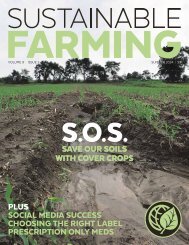
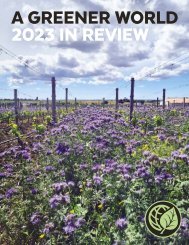
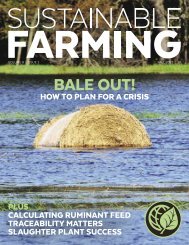
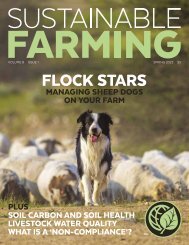
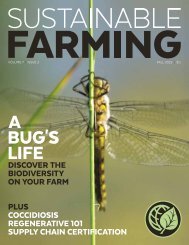
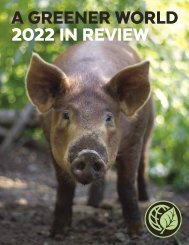
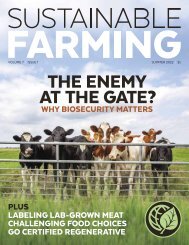
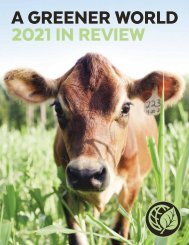
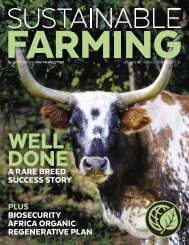




![SF Magazine V5 I1 -- Winter-Spring 2020 [SCREEN ONLY]](https://img.yumpu.com/63122871/1/190x245/sf-magazine-v5-i1-winter-spring-2020-screen-only.jpg?quality=85)